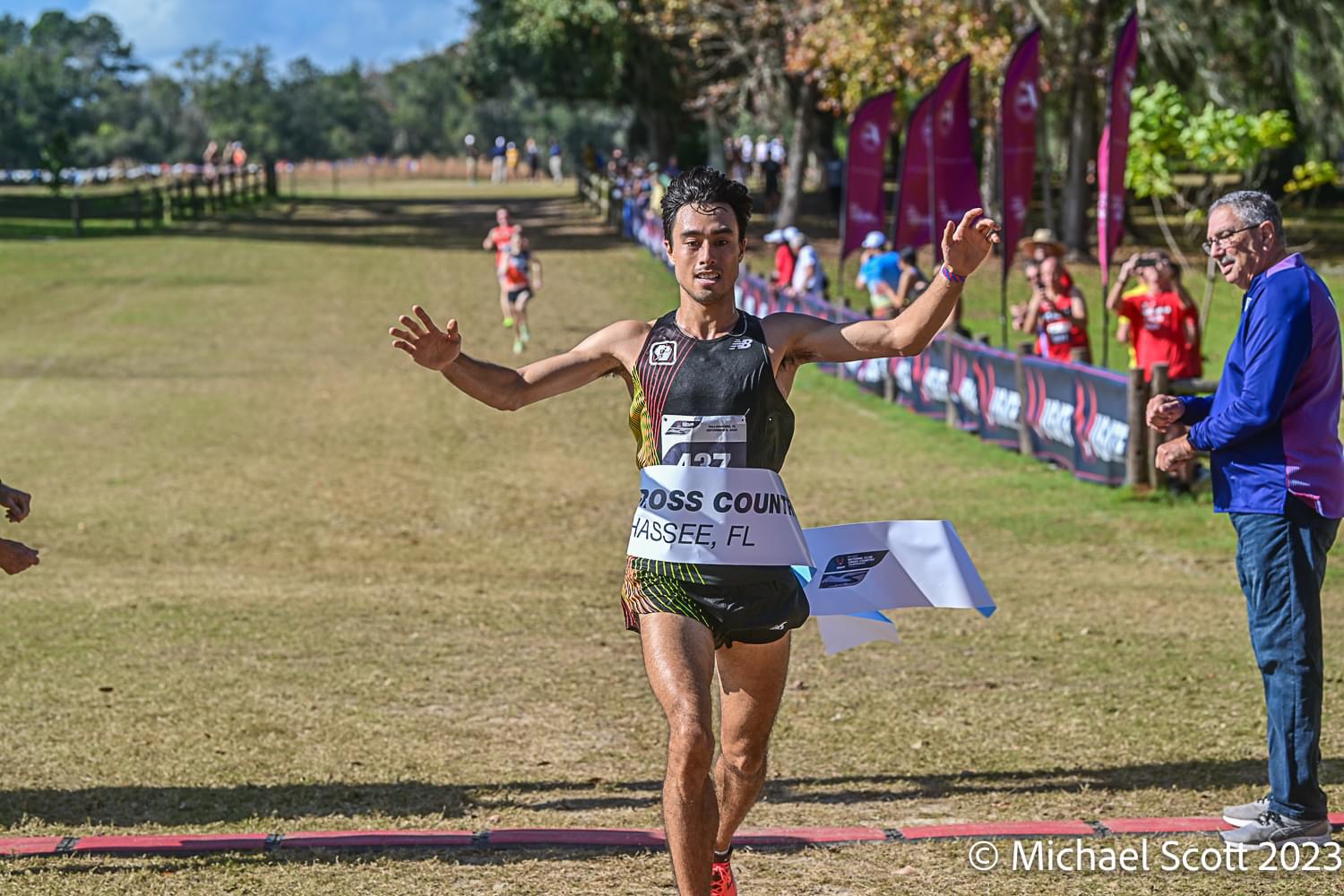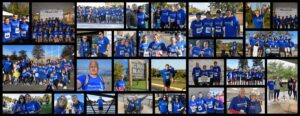After three eight-mile loops of downtown Atlanta, Nick Golebiowski was approaching the end of the Olympic Marathon Trials feeling no worse for the wear. Sure, the hills were rough and he was well off of his PR, but the race experience had been pretty good. And then…
“Wow, those last couple of miles were brutal,” he said. “A few wind gusts pushed me sideways.”
Like the end of a horror movie, everyone thought the monster was dead, but it came back at the end for every protagonist in the race. Golebiowski’s overall effort started to catch up to him on the two-mile epilogue loop when conditions got their worst.
“My arms and shoulders were getting tingly,” he said. “I’ve never been in a place like that.”
Golebiowski finished 81st in 2:22:47, the first of three finishers who live in the D.C. area. Two former local high school runners, Jonny Phillips (40th in 2:17:51) and Chase Weaverling (64th in 2:20:58), were the top finishers with ties to the region.
Phillips, a Thomas Jefferson alumnus living in Boston, ran a PR, the culmination of a year of training that included three solid half marathons that raised his confidence, including a 1:04:11 at the Houston Half Marathon in January.
2020 Olympic Marathon Trials
Feb. 29, Atlanta
Three women with local ties finish in top 20 at Olympic Trials
Contributors
Charlie Ban
Dickson Mercer
Maggie Lloyd
Vanessa Junkin
He met up with old roommate Lou Serafini a mile in and the two covered 16 miles together.
“He was just the guy I needed,” Phillips said. “He was patient when I was impatient and I was patient when he was impatient. We would take turns in the wind, pick up water and share it with each other.”
Phillips started moving ahead with eight miles left; he also had a rough two miles at the end, including some vomiting. The vomiting continued at the finish line and the medical team directed Phillips, who thought he had finished 70th, to be treated.
“I thought I crossed the line in 70th place, just based on the number of people I saw in front of me 8 miles before on Peachtree Street (a five-mile out-and-back section), not realizing how many people dropped out and how many people I passed,” he said. “I didn’t have my phone when I was in the tent and when I got out, my girlfriend called me and told me I was 40th.
“I was on top of the world. I didn’t set a place goal or anything, but that was so far from where I thought.”
Weaverling, who ran at Poolesville, was running his first marathon, after qualifying at the 2019 Houston Half Marathon.
“I thought I executed pretty well,” he said. “I went out and found a group that was running 5:10-5:15 pace for the first half and I felt really good through 16 miles.”
On his own at mile 20, he kept pushing past the point of his longest training run.
“It got pretty rough at the end,” he said. “I saw a sign that said ‘600 meters to go’ and I thought ‘well, maybe…'” he would make it to the finish line.
He spent the last year-plus training with the Reebok Boston Track Club in Charlottesville, where he ran at Virginia. Many of his workouts have been adapted from those planned for Marty Hehir (sixth) and Colin Bennie (ninth).
“We’d do 10 mile tempos, they’d run sub-five, I’d run 5:05-5:10,” Weaverling said. “They’ve been a league of their own the last four months and I learned a lot about how to approach the marathon from them.”
Golebiowski started his race conservatively, running with Arlington’s Dan Meteer early on, feeling free after a rigorous few weeks of work ended Thursday when his client’s earnings report came out.
“In the first 10 miles I had the typical marathon ‘I feel great’ experience, and I don’t think slowing down would have helped,” he said.
Golebiowski passed some runners at 16, but took a few miles too fast. He knew the race wouldn’t be as fast as his qualifying race at Indianapolis’s Monumental Marathon, but enjoyed the Atlanta atmosphere.
“The majority of the races we do to get fast times are built for just that, but this one tested your fitness,” he said. “Those courses may be fast, but you’re not getting those kinds of crowds like we had today. There were constant tunnels of people. There were people who didn’t plan it ringing cowbells and they ended up hitting a good rhythm together.”
He felt like he was doing damage control at the end of the race, but kept the setting in mind.
“I was going in and out of remembering that this was the Olympic Trials. There was so much going on, the hills and the wind. I was trying to execute in that last loop but also take it all in.”
Like Golebiowski, Meteer (2:24:45) was running a much tougher course for his second marathon.
“I know if it was a flat course I would have still struggled a little,” he said. “I’m very pleased with how I handled the adversity of the course. It would have been very easy for me to bail out.”
With a 143rd place finish at the NCAA Pre-National meet as his highest college cross country finish, Meteer set that as his finish goal. He ended up 96th.
Starting at 5:18 pace, he was deep in the pack. By mile 14, his legs felt heavy. By mile 19 he went looking for a bathroom, but both portable toilets he found were occupied. He did what he needed to do, and started to pick off runners.
“I never went a long stretch without passing people,” he said. “I didn’t expect to feel good enough to do that given the way the first 20 miles went.
He was proud of running well despite of the challenges early on and learned that a long race like the marathon offers chances for redemption.
“You can start to hurt really bad, slow down and still have a really good race,” he said. “That course was as bad as advertised, though. Those hills took a subtle toll on my legs.”
Two miles into his first Olympic Trials, Atlanta native and University of Maryland alumnus Patrick Reaves felt things go sideways, particularly his left foot.
“I was reaching for my water bottle, there was a big crowd, and my foot just rolled over,” he said.
He wasn’t sure how badly he had damaged his foot, possibly breaking a metatarsal, but he was determined to run as long as he could.
“If it was a regular marathon, I wouldn’t have finished, but I don’t know if I’ll be here again,” he said. “I don’t know if I’ll have the opportunity, so I wanted to manage as long as I could still be competitive,” he said from an urgent care facility, waiting for xrays. His foot turned out to be sprained. “This was just not good timing.”
Though he didn’t feel his foot being as effective, Reaves kept racing, and eventually started running guys down in the last 10k.
“People were walking, I was still passing people,” he said. “I did what I could.”
He finished 140th in 2:30:25.
Centennial alumnus Brian Harvey followed his plan to start the race conservatively, which placed him in the back of the entire field at the beginning.
“I think it was the hardest marathon I’ve ever run,” he said. He worked his way up through the punishing course, but the last four miles got “really tough” as his legs felt like they weren’t functioning anymore.
In hindsight, he thinks more specific hill work may have better prepared him for the race, but he still called it a fun experience. The endless cheering along the entire course certainly helped.
“I was amazed by how many people were out there,” he said, although it made it tough to spot his family. He finished 116th in 2:26:37, not far behind Boston Athletic Association training partner Alex Taylor, a Woodbridge High School alumnus who finished 105th in 2:25:19.
Everett Hackett, who ran cross country and track at George Mason University, finished the race in 2:31:36 for 147th place.
“It was rough but fun,” Hackett said.
About a month ago, he wasn’t even sure if he’d be able to run because of an achilles problem. But it started getting better, and on Saturday, he was able to run, with his family in town to support him.
“Today, I just wanted to make sure that I could finish the race,” he said.
Although his paces per mile varied, he said he was able to pass other runners in the second half, and his first and second half splits were close — he passed the halfway point in 1:15:30.
Kieran O’Connor, the Arlington resident who finished 24th in 2016, ran 2:23:57 for 86th.
He didn’t feel great from the start, but “that’s what the Trials are about,” he said. “The course got tougher as the day went on,” he said. “The first lap … was just constant hills – nothing was flat.”
By mile 14, he was just trying to slow the process of his wheels falling off as much as possible.
“I was definitely kind of happy to hang in there,” he said. “You never want to be ‘hanging in there’ that early in a marathon but it’s better than completely falling apart.”
In contrast to Los Angeles in 2016, when he outlasted runners over the last lap, they didn’t die as hard in Atlanta. Everyone slowed down gradually.
The other contrast to the last Trials was seeing several dozen family members six times on the course. Last time, he was the only member of his family in town, as his wife was recovering from childbirth three days before. Their “fear the beard” shirts made it easy for him to spot them, even in crowded parts of the course. And he liked that they got to see what he saw in the event.
“What I love about the trials is that (for many runners) there’s no objective success, you have to define your own success,” he said. “If you’re trying to set a standard of success for yourself that’s going to make you unhappy no matter what, then what’s the point? Go out there and give it your effort.”
Recent Stories
Looking for our race calendar? Click here Submit races here or shop local for running gear
James W. Foley Freedom Run
Inspired by the moral courage of freelance journalist James Foley, the mission of the nonprofit Foley Foundation is to secure the freedom of Americans held captive abroad unjustly by terrorist organizations or rogue states, and to promote journalist safety.
The
Kensington 8K Race
Since 1994, the Kensington 8K Race has been a favorite DC area fall race – a fun, fast event with beauty, challenge, and excitement. Run it this year on Saturday, September 21, 2024!
The 8K distance is $39, with a






